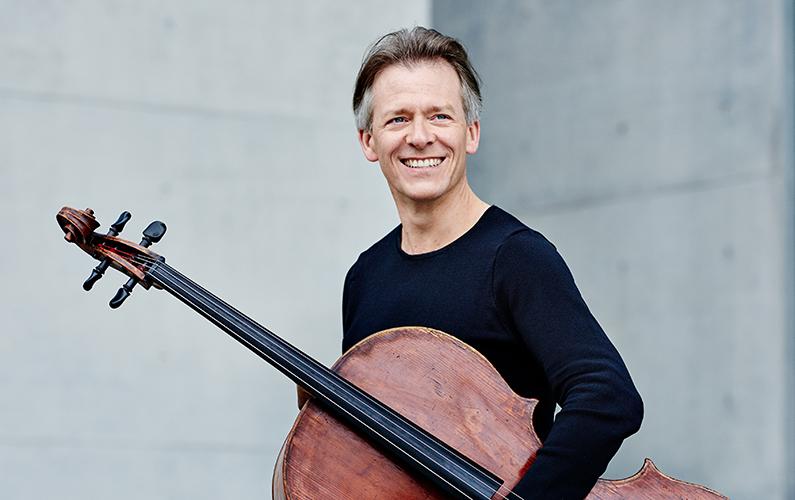Gerhardt, RPO, Payare, RFH review - personality muted by faceless conducting | reviews, news & interviews
Gerhardt, RPO, Payare, RFH review - personality muted by faceless conducting
Gerhardt, RPO, Payare, RFH review - personality muted by faceless conducting
Cellist-knight can't completely rescue an evening more about sound than expression

Former Royal Philharmonic Orchestra principal conductor Charles Dutoit has been exposed, to little surprise from musicians, as something of a roué whose apparent refusal to take "no" for an answer has rubbed up against the new #MeToo world. So his place in last night's concert was taken by Venezuelan Rafael Payare, not yet 40.
Payare cuts a curious caper on the podium. The dancing legs in slightly too-short trousers seem to help him in moving fluently from one tempo to another - no easy feat in the second half of Strauss's volatile "Variations on a Theme of Knightly Character" Don Quixote, brilliantly accomplished here. But the arms are raised too high, and too symmetrically, too often: does that encouragement to the orchestra to play louder prevent the sound ever going much below mezzo-forte?
Even as one lamented the lack of forward momentum, this too laid-back quality for Strauss's idealistic, serial-monogamist Juan, it was hard not to admire the sheer brilliance of an orchestra which doesn't get to play major concerts nearly as often as its other London counterparts, set against whom its reputation has long been patchy. That's unfair: the strings can be truly voluptuous, there's no better horn section in town and among the woodwind principal oboist John Roberts gave us a shapely second love, though Payare wasn't going to go for any of the necessary vulnerability.  Shorn of the external glitter, Mozart's "Haffner" Symphony (No 35) exposed more worryingly Payare's apparent lack of interest in what the music has to say. Without the charm, the vocalising in the second movement and the fizz in the finale, it all fell disappointingly flat. Only some stylish trills and roulades in the outer portions of the Menuetto saved the performance from total anonymity.
Shorn of the external glitter, Mozart's "Haffner" Symphony (No 35) exposed more worryingly Payare's apparent lack of interest in what the music has to say. Without the charm, the vocalising in the second movement and the fizz in the finale, it all fell disappointingly flat. Only some stylish trills and roulades in the outer portions of the Menuetto saved the performance from total anonymity.
Would the arrival of collegial, live-wire cellist Alban Gerhardt (pictured above) as the Knight of the Woeful Countenance galvanise conductor and orchestra into a more vivid way with what is Strauss's most intricately perfect symphonic poem? Only up to a point; after all, this is not a cello concerto, despite four purple patches for the soloist, and it seemed Gerhardt had to go along with Payare's lack of poetry in the usually gorgeous "castles in the air" vision of Variation Three. He didn't force the point of the characterisation, duetted engagingly with leader Duncan Riddell and flicked water at the plucky Sancho Panza of principal viola-player Abigail Fenna after emerging from the not-so-enchanted boat of Variation 8. But the exuberance of his Hyperion recording was largely absent, possibly because he was necessarily focused on trying to follow his none too clear conductor.
Despite the soloistic team's best efforts, and some splendid work from tenor tuba (presumably the "euphonium" listed in the programme), the performance as a whole remained as earthbound as the wooden horse which the blindfolded knight and squire believe to be carrying them through the air. And though balances in the intricate counterpoint of Quixote's madness were superb, there was little sense of this being Strauss's greatest "opera for orchestra" - a shame, because it was perfectly cast. But actors are only as good as their director gives them space to be, and Payare isn't sending out the right expressive signals to his players as yet.
rating
Share this article
Add comment
The future of Arts Journalism
You can stop theartsdesk.com closing!
We urgently need financing to survive. Our fundraising drive has thus far raised £49,000 but we need to reach £100,000 or we will be forced to close. Please contribute here: https://gofund.me/c3f6033d
And if you can forward this information to anyone who might assist, we’d be grateful.

Subscribe to theartsdesk.com
Thank you for continuing to read our work on theartsdesk.com. For unlimited access to every article in its entirety, including our archive of more than 15,000 pieces, we're asking for £5 per month or £40 per year. We feel it's a very good deal, and hope you do too.
To take a subscription now simply click here.
And if you're looking for that extra gift for a friend or family member, why not treat them to a theartsdesk.com gift subscription?
more Classical music
 BBC Proms: Ehnes, Sinfonia of London, Wilson review - aspects of love
Sensuous Ravel, and bittersweet Bernstein, on an amorous evening
BBC Proms: Ehnes, Sinfonia of London, Wilson review - aspects of love
Sensuous Ravel, and bittersweet Bernstein, on an amorous evening
 Presteigne Festival 2025 review - new music is centre stage in the Welsh Marches
Music by 30 living composers, with Eleanor Alberga topping the bill
Presteigne Festival 2025 review - new music is centre stage in the Welsh Marches
Music by 30 living composers, with Eleanor Alberga topping the bill
 Lammermuir Festival 2025 review - music with soul from the heart of East Lothian
Baroque splendour, and chamber-ensemble drama, amid history-haunted lands
Lammermuir Festival 2025 review - music with soul from the heart of East Lothian
Baroque splendour, and chamber-ensemble drama, amid history-haunted lands
 BBC Proms: Steinbacher, RPO, Petrenko / Sternath, BBCSO, Oramo review - double-bill mixed bag
Young pianist shines in Grieg but Bliss’s portentous cantata disappoints
BBC Proms: Steinbacher, RPO, Petrenko / Sternath, BBCSO, Oramo review - double-bill mixed bag
Young pianist shines in Grieg but Bliss’s portentous cantata disappoints
 theartsdesk at the Lahti Sibelius Festival - early epics by the Finnish master in context
Finnish heroes meet their Austro-German counterparts in breathtaking interpretations
theartsdesk at the Lahti Sibelius Festival - early epics by the Finnish master in context
Finnish heroes meet their Austro-German counterparts in breathtaking interpretations
 Classical CDs: Sleigh rides, pancakes and cigars
Two big boxes, plus new music for brass and a pair of clarinet concertos
Classical CDs: Sleigh rides, pancakes and cigars
Two big boxes, plus new music for brass and a pair of clarinet concertos
 Waley-Cohen, Manchester Camerata, Pether, Whitworth Art Gallery, Manchester review - premiere of no ordinary violin concerto
Images of maternal care inspired by Hepworth and played in a gallery setting
Waley-Cohen, Manchester Camerata, Pether, Whitworth Art Gallery, Manchester review - premiere of no ordinary violin concerto
Images of maternal care inspired by Hepworth and played in a gallery setting
 BBC Proms: Barruk, Norwegian Chamber Orchestra, Kuusisto review - vague incantations, precise laments
First-half mix of Sámi songs and string things falters, but Shostakovich scours the soul
BBC Proms: Barruk, Norwegian Chamber Orchestra, Kuusisto review - vague incantations, precise laments
First-half mix of Sámi songs and string things falters, but Shostakovich scours the soul
 BBC Proms: Alexander’s Feast, Irish Baroque Orchestra, Whelan review - rapturous Handel fills the space
Pure joy, with a touch of introspection, from a great ensemble and three superb soloists
BBC Proms: Alexander’s Feast, Irish Baroque Orchestra, Whelan review - rapturous Handel fills the space
Pure joy, with a touch of introspection, from a great ensemble and three superb soloists
 BBC Proms: Moore, LSO, Bancroft review - the freshness of morning wind and brass
English concert band music...and an outlier
BBC Proms: Moore, LSO, Bancroft review - the freshness of morning wind and brass
English concert band music...and an outlier
 Willis-Sørensen, Ukrainian Freedom Orchestra, Wilson, Cadogan Hall review - romantic resilience
Passion, and polish, from Kyiv's musical warriors
Willis-Sørensen, Ukrainian Freedom Orchestra, Wilson, Cadogan Hall review - romantic resilience
Passion, and polish, from Kyiv's musical warriors
 BBC Proms: Faust, Gewandhausorchester Leipzig, Nelsons review - grace, then grandeur
A great fiddler lightens a dense orchestral palette
BBC Proms: Faust, Gewandhausorchester Leipzig, Nelsons review - grace, then grandeur
A great fiddler lightens a dense orchestral palette

Comments
This review is a joke! It was
Just for the record, there is
Very kind of you to say 'just
Very kind of you to say 'just for the record' - that was a rash assumption on my part and of course I checked the score since, so out goes that remark. Even so, I'd usually love to hear an exposition repeat, wouldn't you?